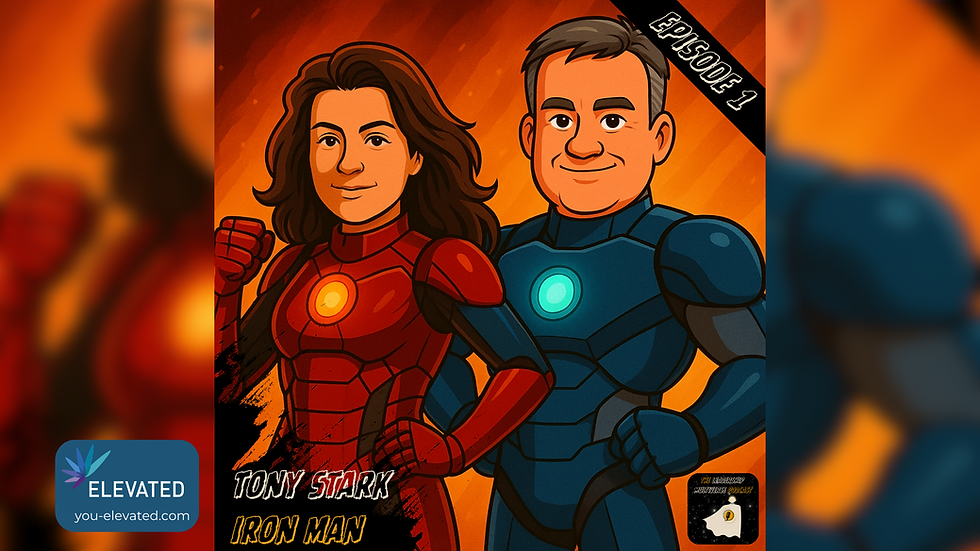Jean-Luc Picard: A 24th-Century Captain for 21st-Century Leadership
- Andrew Chamberlain

- Sep 8, 2025
- 3 min read
Star Trek Day is upon us, and while some may be celebrating by quoting “Live long and prosper” or revisiting their favourite episodes, I’ve been reflecting on a character who has quietly shaped my own understanding of leadership: Captain Jean-Luc Picard.
Patrick Stewart’s portrayal of Picard is more than just another starship captain. He is a diplomat, philosopher, and strategist, leading not by bravado, but by calm authority, deep ethics, and intellectual curiosity. And in a world that is grappling with what good leadership looks like, there’s plenty we can learn from this 24th-century figure.
Calm in Crisis
One of Picard’s most striking traits is his composure. Whether facing down the Borg, negotiating with Romulans, or being held captive by the Cardassians, Picard remains steady. He does not panic, shout, or issue rash commands. Instead, his calmness becomes a psychological anchor for his crew.
This is a lesson many leaders overlook. Teams draw energy (be it positive or negative) from their leaders. When leaders lose their heads, confusion and mistrust ripple through an organisation. Picard shows that calm under pressure is not the absence of emotion, but the disciplined choice to hold steady so that others can perform at their best.
An Ethical Compass
Picard is defined by principles. He interprets and occasionally bends the Prime Directive (Starfleet’s rule of non-interference) but only ever after carefully weighing the ethical consequences. His decisions are not driven by personal gain or ego but by a profound sense of responsibility to others. In today’s boardrooms and businesses, ethical leadership is more essential than ever. Stakeholders expect transparency, accountability, and fairness. Leaders who act as moral compasses build trust that outlasts short-term wins. Picard’s example reminds us that credibility stems not from power, but from consistency in values.
Empowering Others
Unlike some fictional captains, Picard doesn’t micromanage. He trusts his officers, famously handing the bridge to Riker with the simple phrase, “Number One, you have the bridge.” He listens to advice, debates with his senior team, and often incorporates diverse viewpoints into his final decisions. Empowerment like this creates loyalty. It builds a culture where people want to stay and grow, even when opportunities elsewhere beckon. Research into employee engagement echoes what writers built into Picard’s character: people thrive under leaders who empower them rather than control them.
Cultural Curiosity
One of the most memorable episodes of The Next Generation (“Darmok”) sees Picard stranded with an alien captain who speaks only in metaphor. Instead of resorting to frustration or violence, Picard works patiently to understand. He adapts, listens, and ultimately finds common ground. That cultural curiosity, combined with intellectual playfulness, is a hallmark of modern leadership. In our global, multi-generational workplaces, leaders succeed when they embrace difference and lean into the discomfort of not knowing. Curiosity, not certainty, is often what builds collaboration and innovation.
The Role of the System
Picard is not an isolated hero. He operates within Starfleet: a structure that provides guardrails, resources, and shared purpose. While we see him making first-contact decisions that feel solitary, he is backed by an entire federation that values diplomacy, inclusion, and service. This is a crucial reminder for any leader. Leadership does not exist in a vacuum. The systems and cultures around us either enable or inhibit our ability to lead well. Even the strongest individual leader will struggle without supportive governance, healthy culture, and aligned values.
Flawed but Evolving
Perhaps the most important lesson from Picard is that he is not flawless. He loses ships. He is scarred physically and emotionally. He wrestles with guilt and doubt. Yet he learns and evolves. Unlike the sudden conversions of some fictional leaders, Picard’s growth is gradual, subtle, and very human. This resonates with modern leadership development. Most of us don’t transform overnight after a single failure. We grow incrementally, shaped by experience, reflection, and feedback. Leadership is less about perfection and more about progress.
Why Picard Still Matters
It’s remarkable to think that The Next Generation first aired in 1987, long before “psychological safety,” “servant leadership,” or “inclusive cultures” became mainstream terms. And yet, Jean-Luc Picard embodies these principles. He is, in many ways, a distinctly 21st-century leader written decades ahead of his time.
So what can we take away?
Stay calm in crisis: your team takes their cues from you.
Let ethics guide decisions: values outlast transactions.
Empower people: trust breeds loyalty.
Be curious: difference is an opportunity, not a threat.
Recognise the system: leaders thrive in healthy cultures.
Embrace imperfection: growth is gradual, not instant.
Jean-Luc Picard may be fictional, but the leadership lessons he models are real. As leaders in organisations today, we may not be navigating alien diplomacy or commanding starships, but we are still asked to lead through complexity, inspire loyalty, and hold firm to our values. In that sense, perhaps the 24th century has already arrived, and Picard’s leadership is exactly what the 21st century needs. 🖖




Comments